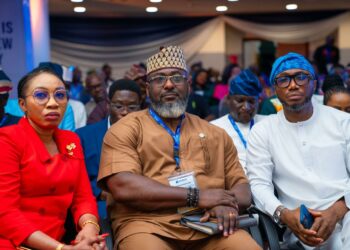The fact that the Information and Communications Technology (ICT) sector has continued to provide value and rescue other industries in trouble despite the global economic crisis, cannot be overemphasised.
No wonder, the sector is one of the biggest contributors to the GDP of Nigeria, overtaking the oil sector which had been the economic cornerstone of the country for decades.
However, this same sector, that has been acclaimed to have done so well in recent time, was marred with challenges ranging from multiple taxation, damages of infrastructures, forex scarcity, poor internet connectivity to intercompany/external debts in 2023, stakeholders averred; they are also optimistic that with meaningful collaboration, these issues can be resolved in 2024.
According to stakeholders who spoke with NATIONAL ECONOMY, a number of teething investment-impacting causal factors need to be definitively addressed to help deepen investment with the objective of driving increased CAPEX deployment for overall Quality of Service (QoS) improvement in line with the targets of the Strategic Plan to achieve 50 per cent improvement in QoS by the end of 2024.
For instance, on multiple taxation, the chairman, Association of Licensed Telecommunication Operators of Nigeria (ALTON), Engr. Adebayo Gbenga told NATIONAL ECONOMY, that ALTON’s members currently pay at least 49 different taxes and levies, adding that, “Our members continue to bear the brunt of multiple taxation and coerced compliance with tax and levy demands that have no legal basis by sub-nationals. This threatens investment, sustainability and industry growth.
“These taxes include exorbitant Right of Way fees, increases under the Finance Act 2023 (such as upward review of Tertiary Education Trust Fund Tax from 2.5 per cent to 3 per cent, imposition of Value Added Tax on cell towers (Base Stations), imposition of import levy on goods, removal of capital allowance on telecommunications goods and services under Section 32 of the amended Companies Income Tax Act), amongst others.”
This challenge can be tackled in 2024, with collaborative partnership with collaborate with the presidential committee on Fiscal Policy and Tax Reforms to definitively address the perennial incidence of multiple taxation in the Nigerian telecommunications sector including the elimination of the currently suspended excise duty on telecommunications services, Gbenga posited.
“Collaborate with the Presidential Committee on Fiscal Policy and Tax Reforms to definitively address the perennial incidence of multiple taxation in the Nigerian telecommunications sector including the elimination of the currently suspended excise duty on telecommunications services,” he added.
In terms of damages to telecoms infrastructure, ALTON chairman, also advocated for collaboration with key stakeholders to secure Executive and Legislative action on the declaration of telecoms infrastructure as Critical National Infrastructure (CNI) and criminalisation of malicious site sealing, access denials, and willful/negligent destruction of telecommunications infrastructure.
“This can be done either by an Executive Order or relevant amendment of the Cybercrimes Act; an attempt was made by the immediate past National Security Adviser (NSA) to secure Presidential approval for an Executive Order (EO). We appeal to the minister of Communications, Innovations and Digital Economy, Dr. Bosun Tijani to liaise with the current NSA to bring to fruition the executive order on CNI,” he appealed.
On effective rollout of broadband services in Nigeria, Gbenga suggested that for the federal government to achieve 70 per cent broadband penetration by 2025, there is need to embark on more sensitisation and advocacy for state governments’ adoption of the harmonised RoW charge of N145/Linear Meter approved by the National Economic Council in 2019, beginning 2024.
Access to forex was a major challenge in 2023 as ALTON chairman called on the Nigerian Communications Commission (NCC) to liaise with relevant stakeholders such as the CBN for the institution of intervention measures to support the telecommunications sector. Such interventions could include the introduction of a special FOREX Window for the industry, set-up of long-term, low interest infrastructure funding schemes, he added.
In the same vein, policy advisor and founder, Science, Technology and Innovation, Mr Jide Awe told NATIONAL ECONOMY there should be more collaboration with operators, if government must achieve broadband targets. NCC must sit down with them to understand their challenges, Awe suggested.
“Issues like RoW, damages to infrastructure, rollout of broadband service, QoS and intercompany and USSD debts can easily be resolved in 2024, if NCC can collaborate with players and other stakeholders.
“No doubt, NCC has great policies that could move the ICT sector to the next level, but then, there are lots of bureaucracies in implementing them. NCC must sit down with players who are rolling out ICT services. The regulator must know their challenges and find ways to solving them,” Awe stated.
Citing an example, the policy advisor affirmed that the broadband targets set by the federal government is commendable, but to achieve them, there is need for operators to go to the unserved and underserved communities.
To encourage players to deploy infrastructure in those areas, however, the federal government must set aside soft loan as incentives, he revealed.
The Universal Service Provision Fund (USPF) was established by the federal government of Nigeria to facilitate the achievement of national policy goals for universal access and universal service to ICTs in rural, un-served and under-served areas in Nigeria. The Fund is being managed to facilitate the widest possible access to affordable telecommunications services for greater social equity and inclusion for the people of Nigeria.
“Government must make noise about this fund, so that more players can key into it. The Agency in charge of the fund must make it more transparent, as it disburse the fund,” Awe advised.
Meanwhile, the executive vice chairman of the NCC, Dr. Aminu Maida, has promised stakeholders he will deal with these problems while emphasising Quality of Experience (QoE) for all Nigerians.
“I have been on this seat for about six weeks, and it has afforded me the privilege of a bird’s eye view to understand things better and pinpoint areas that require immediate attention. We are now doing a thorough investigation and critical assessment of industry-related problems. QoE is one of the areas we are prioritising.
“We made it clear during my meeting with industry executives that QoE will not be negotiable. The Commission will take compliance in this regard seriously and will set a standard of what is least acceptable,” he said.
Under his leadership, the NCC boss assured that the Commission will give priorities to the improvement of its regulatory activities, adding that “With this, we hope to see more investors come into the telecommunications industry in Nigeria, with the attendant creation of vertical businesses and increased Foreign Direct Investments, revenue generation, and employment.
“In all these, the goal is for the Commission to achieve optimal operational excellence which underpins the success of all other priority areas that we have set in order to achieve a significant all-round growth of the telecommunications industry.”





